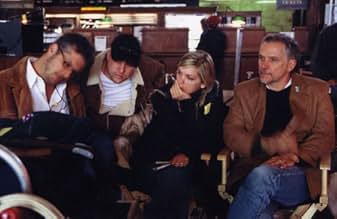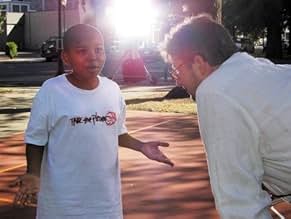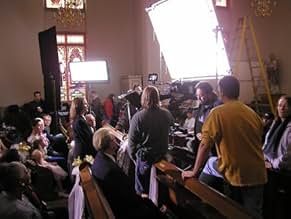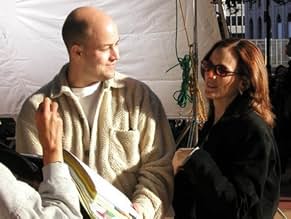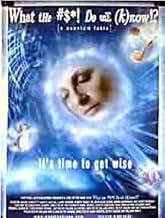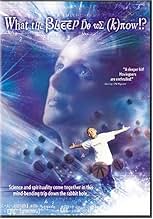AVALIAÇÃO DA IMDb
5,2/10
14 mil
SUA AVALIAÇÃO
Adicionar um enredo no seu idiomaA fictional photographer's quest to spiritually rediscover herself is interspersed with documentary footage of scientists and theologians discussing the philosophical aspects of quantum phys... Ler tudoA fictional photographer's quest to spiritually rediscover herself is interspersed with documentary footage of scientists and theologians discussing the philosophical aspects of quantum physics.A fictional photographer's quest to spiritually rediscover herself is interspersed with documentary footage of scientists and theologians discussing the philosophical aspects of quantum physics.
- Direção
- Roteiristas
- Artistas
- Prêmios
- 2 vitórias no total
James Langston Drake
- Groom
- (as Jame Drake)
Michele Mariana
- Tour Guide
- (as Michelle Mariana)
Avaliações em destaque
About 20 years ago, I encountered quantum mechanics in The Dancing Wu Li Masters by Gary Zukav, and the Tao of Physics by Fritjof Capra. Despite the *relative* popularity (note the emphasis on "relative") of such books, the average person in the street has never read a science book that wasn't assigned to them in high school or college. And those books certainly weren't speculating on the nature of Life, the Universe and Everything based on the implications of quantum physics!
In my own life, awareness of the intersection of science of spirituality has given me a smidgen of additional fuel in my life of studying Christian and Eastern mysticism. So imagine my delight when I learned "What the Bleep" promised an exciting investigation into the cutting edge of science and spirituality. Surely there would interviews with people like Rupert Sheldrake, Freeman Dyson, and Larry Dossey!
Well, no, although most of the scientists were well-qualified to speak on the quantum concepts addressed. Strangely, the film undercut itself intellectually by not giving the names and qualifications of the speakers underneath their "talking heads" but only at the end. Regarding spiritual speculations, I find Capra, Sheldrake, and Dossey have more depth when it comes to this sort of thought, but the opinions shared may be eye-opening for many viewers who have never considered the inter-connectedness of mind, the universe, and God.
"What the bleep" has a beautiful visual style, exciting graphic effects, and also gets out of typical documentary mode by creating a small story of a deaf woman photographer's frustrations with life. The "Polish Wedding" sequence is hilarious, and might actually have you rolling in the aisles, as it did me!
The disappointment comes, oddly enough from the "Spiritual Teachers, Mystics, and Scholars" used. Sounds impressive right? There were only two. One was "Miceal" Ledwith, (elsewhere spelled Micheal), former member of the Catholic International Theological Commission, (who retired from Maynooth College in Ireland about the same time he made a private settlement regarding sexual abuse of a minor--see the Irish Times article of June 1 2002). The other was--get ready--RAMTHA! Yes, Ramtha, the absurd "Neolithic entity" supposedly channeled by JZ Knight.
Both Ledwith and Ramtha seemed to only be used to bash conventional religion with "the shackles of restrictive doctrine," and in Ramtha's case, assure us all that we are God. Yippee! No need to worry about meditation, service, or denying the ego. Why, I wondered, would someone go to the trouble of sharing the scientific plausibility of mysticism only to undercut it with the bitter statements of a former Catholic priest and the laughingstock of New-Age kookiness?
Perhaps it's because, according to Wikipedia.org, all three filmmakers are students of the Ramtha School of Enlightenment. Ultimately this was a long, entertaining commercial. Ramtha will see you now. Keep your ego, but bring your checkbook.
In my own life, awareness of the intersection of science of spirituality has given me a smidgen of additional fuel in my life of studying Christian and Eastern mysticism. So imagine my delight when I learned "What the Bleep" promised an exciting investigation into the cutting edge of science and spirituality. Surely there would interviews with people like Rupert Sheldrake, Freeman Dyson, and Larry Dossey!
Well, no, although most of the scientists were well-qualified to speak on the quantum concepts addressed. Strangely, the film undercut itself intellectually by not giving the names and qualifications of the speakers underneath their "talking heads" but only at the end. Regarding spiritual speculations, I find Capra, Sheldrake, and Dossey have more depth when it comes to this sort of thought, but the opinions shared may be eye-opening for many viewers who have never considered the inter-connectedness of mind, the universe, and God.
"What the bleep" has a beautiful visual style, exciting graphic effects, and also gets out of typical documentary mode by creating a small story of a deaf woman photographer's frustrations with life. The "Polish Wedding" sequence is hilarious, and might actually have you rolling in the aisles, as it did me!
The disappointment comes, oddly enough from the "Spiritual Teachers, Mystics, and Scholars" used. Sounds impressive right? There were only two. One was "Miceal" Ledwith, (elsewhere spelled Micheal), former member of the Catholic International Theological Commission, (who retired from Maynooth College in Ireland about the same time he made a private settlement regarding sexual abuse of a minor--see the Irish Times article of June 1 2002). The other was--get ready--RAMTHA! Yes, Ramtha, the absurd "Neolithic entity" supposedly channeled by JZ Knight.
Both Ledwith and Ramtha seemed to only be used to bash conventional religion with "the shackles of restrictive doctrine," and in Ramtha's case, assure us all that we are God. Yippee! No need to worry about meditation, service, or denying the ego. Why, I wondered, would someone go to the trouble of sharing the scientific plausibility of mysticism only to undercut it with the bitter statements of a former Catholic priest and the laughingstock of New-Age kookiness?
Perhaps it's because, according to Wikipedia.org, all three filmmakers are students of the Ramtha School of Enlightenment. Ultimately this was a long, entertaining commercial. Ramtha will see you now. Keep your ego, but bring your checkbook.
It's nice to see that there are some movies being made and released into mainstream theaters that actually make you think. Great fictional films do this through the delivery of their stories, but What the #$*! Do We Know does it in a much more direct way, almost like an educational film. It's a fascinating exploration of existential theories and philosophy, and is one of those very rare movies that will challenge the way you think even about everyday life. It's a strange film and moves entirely too fast for much of it's material to sink in, but it's a great exploration of quantum physics and some of the implications that it has on our lives that we really don't think about, but should.
The story sporadically focuses on the life of Amanda (Marlee Matlin), a deaf woman suffering through heartbreak and work troubles but who ultimately alters her perception by applying certain rules and theories of quantum physics, as I imagine we are expected to after seeing the movie. The great thing about the movie is that it makes you think, but the biggest problem with it is that it uses presentation to make simple statements seem grand and make crazy assertions seem like they have merit.
There is one point where the movie says, "Here's a puzzle - why should we be able to remember the past and not have the same access to the future?'' What is that? A completely obvious fact of linear time is rendered strange just by being in this movie. It's odd that the movie delves so deep into such statuesque disciplines as quantum physics and the very fabric of the universe, while not knowing why you can remember a conversation you had today, but for some weird, unknown and mysterious reason, you can't remember a conversation you will have tomorrow.
The film also makes outlandish claims and then shrouds them in the mysteriousness of unobservable history. There is a part of the movie that claims that when the first ships arrived in what is now North America, the Native Americans looked out to sea and saw the water parted by the ships, but could not see the ships themselves because they had never seen anything like them before. This, obviously, is utter nonsense, but the movie uses it as an example of its suggestion that there are different levels of reality for different people. There is no pure, objective reality, but different plains of existence for different people.
A friend of mine, who hails this as one of the greatest films he's ever seen, explained to me that the Native Americans' minds simply did not understand how to decode the concept of a ship, a signifier which they had never encountered and so it was perfectly understandable that they couldn't see it. Wrong! Sure, they had never seen ships before, but I am willing to go out on a limb and assume that they had seen wood before, and since vision is merely the process of light bouncing off of objects and coming into contact with the retina inside the eye, it is physically impossible for a Native American to have x-ray vision because he or she doesn't know what a certain object is.
My friend used the example that it is not until you learn that lightning travels from the ground to the clouds rather than the other way around that you really begin to see it that way. Before you learn that curious little fact, you see lightning and are completely sure that it's coming out of the clouds and zapping the earth. You do see it differently from then on, it's true, but you did SEE it before you knew where it originated, right? And incidentally, lightning is known to travel from the ground to the clouds, from the clouds to the ground, and from one cloud to another. But when it occurs, I am willing to suggest that it's rarely invisible, even if, as they say, there's no one there to see it.
I believe that the human mind is set up to believe what it wants to believe (hence religion), but I do not feel obliged to believe that people's beliefs or knowledge enable them to see through solid objects just because they've never seen them before, nor do I believe that any human has the ability to change the molecular structure of water just by thinking about it in a certain way, which is another of the more bizarre claims that the movie makes. I don't know, I just never thought of water as susceptible to being offended or made happy, or having any effect over human emotions.
But while the movie does slip up by going a little far in claims like these, it's important to have things like this because even for things like invisible ships, which we know are not reality, it is good that it makes you think about them. There are a lot of things in the world that we take for granted, and not just possessions but truths, and it is movies like What the #$*! Do We Know that really get people thinking about them. For a while, at least.
The story sporadically focuses on the life of Amanda (Marlee Matlin), a deaf woman suffering through heartbreak and work troubles but who ultimately alters her perception by applying certain rules and theories of quantum physics, as I imagine we are expected to after seeing the movie. The great thing about the movie is that it makes you think, but the biggest problem with it is that it uses presentation to make simple statements seem grand and make crazy assertions seem like they have merit.
There is one point where the movie says, "Here's a puzzle - why should we be able to remember the past and not have the same access to the future?'' What is that? A completely obvious fact of linear time is rendered strange just by being in this movie. It's odd that the movie delves so deep into such statuesque disciplines as quantum physics and the very fabric of the universe, while not knowing why you can remember a conversation you had today, but for some weird, unknown and mysterious reason, you can't remember a conversation you will have tomorrow.
The film also makes outlandish claims and then shrouds them in the mysteriousness of unobservable history. There is a part of the movie that claims that when the first ships arrived in what is now North America, the Native Americans looked out to sea and saw the water parted by the ships, but could not see the ships themselves because they had never seen anything like them before. This, obviously, is utter nonsense, but the movie uses it as an example of its suggestion that there are different levels of reality for different people. There is no pure, objective reality, but different plains of existence for different people.
A friend of mine, who hails this as one of the greatest films he's ever seen, explained to me that the Native Americans' minds simply did not understand how to decode the concept of a ship, a signifier which they had never encountered and so it was perfectly understandable that they couldn't see it. Wrong! Sure, they had never seen ships before, but I am willing to go out on a limb and assume that they had seen wood before, and since vision is merely the process of light bouncing off of objects and coming into contact with the retina inside the eye, it is physically impossible for a Native American to have x-ray vision because he or she doesn't know what a certain object is.
My friend used the example that it is not until you learn that lightning travels from the ground to the clouds rather than the other way around that you really begin to see it that way. Before you learn that curious little fact, you see lightning and are completely sure that it's coming out of the clouds and zapping the earth. You do see it differently from then on, it's true, but you did SEE it before you knew where it originated, right? And incidentally, lightning is known to travel from the ground to the clouds, from the clouds to the ground, and from one cloud to another. But when it occurs, I am willing to suggest that it's rarely invisible, even if, as they say, there's no one there to see it.
I believe that the human mind is set up to believe what it wants to believe (hence religion), but I do not feel obliged to believe that people's beliefs or knowledge enable them to see through solid objects just because they've never seen them before, nor do I believe that any human has the ability to change the molecular structure of water just by thinking about it in a certain way, which is another of the more bizarre claims that the movie makes. I don't know, I just never thought of water as susceptible to being offended or made happy, or having any effect over human emotions.
But while the movie does slip up by going a little far in claims like these, it's important to have things like this because even for things like invisible ships, which we know are not reality, it is good that it makes you think about them. There are a lot of things in the world that we take for granted, and not just possessions but truths, and it is movies like What the #$*! Do We Know that really get people thinking about them. For a while, at least.
In the Victorian era, the "new science" was the extraordinary new theory of electromagnetism. Maxwell's equations were every bit as revolutionary as relativity or quantum mechanics would be later. The new age religion of the era was spiritualism, the belief in the afterlife and the ability to cross into it.
As surely as snow falls, religion will appropriate the prevailing cosmology for its own ends. A century ago that was science and so it is today. Then, the appropriation of Maxwell's insights on electromagnetism was an amazing confabulation of "animal magnetism" and vibrational resonance. We don't use the term "Mesmerism" any more, but in any new age bookshop, you'll still see references to vibrations. The notion of "auras" is from this era.
Every time science produces new tools, it gets swallowed by folks hungry for some "explanation" of what they would believe in any case. So when there was a new notion of relative time, you had a slew of religious notions woven around it. You can trace the main ones to Ouspensky and Gurdjieff. In that case, psychism and reincarnation found scientific explanations.
Quantum mechanics affords much greater flexibility for the next generation of appropriators, the era we are now in. That's because it has intrinsic mystical features even for the staid physicists who use it.
This movie has three parts. The first merges quantum physics with ordinary life. The second introduces a theory of consciousness that enfranchises individual cells (here shown in animation) with intent and agency. And the third part merges the two in a way that suggests you can control at least your own body and perhaps the physics of the space around you. Its all linked to QM.
The problem is that these folks start with the convincing notion that we live in a world of inadequate models. That's a good insight. Then they introduce QM as if it really was the way the world works. It isn't, folks. Its just another model, and a very, very problematic one at that. In physics, it doesn't even work in the most common force in physics, gravity.
It has absolutely no utility or meaning in the fields of chemistry, biology, and all the social and cognitive sciences that are the lions share of where we actually live. And even where it applies, it applies at scales that are so tiny the notion of "observer" becomes laden with artificial baggage.
There are very serous scientists who are dedicated to eliminating it as a theoretical tool because it reduces the world to numbers, the most ridiculously blunt abstraction. Just because you find a physicist with a PhD, doesn't mean you've found someone who understands the limits of the method.
The real sadness about this is that there really is a mystical vision to be had here. Its one that works with the notion of notation always being ephemeral. These smoothtalking purveyors of happiness are our worst enemy because they simply substitute one mythology for another. You owe it to yourself to study the issues here well enough to discard them.
Otherwise, you might as well just give up and do what the man wants.
I usually like watching movies made by religious zealots. They are often about fighting the devil, and the makers really believe the movie itself fights the devil. Its a cool fold. But this is just dangerous nonsense.
Ted's Evaluation -- 1 of 3: You can find something better to do with this part of your life.
As surely as snow falls, religion will appropriate the prevailing cosmology for its own ends. A century ago that was science and so it is today. Then, the appropriation of Maxwell's insights on electromagnetism was an amazing confabulation of "animal magnetism" and vibrational resonance. We don't use the term "Mesmerism" any more, but in any new age bookshop, you'll still see references to vibrations. The notion of "auras" is from this era.
Every time science produces new tools, it gets swallowed by folks hungry for some "explanation" of what they would believe in any case. So when there was a new notion of relative time, you had a slew of religious notions woven around it. You can trace the main ones to Ouspensky and Gurdjieff. In that case, psychism and reincarnation found scientific explanations.
Quantum mechanics affords much greater flexibility for the next generation of appropriators, the era we are now in. That's because it has intrinsic mystical features even for the staid physicists who use it.
This movie has three parts. The first merges quantum physics with ordinary life. The second introduces a theory of consciousness that enfranchises individual cells (here shown in animation) with intent and agency. And the third part merges the two in a way that suggests you can control at least your own body and perhaps the physics of the space around you. Its all linked to QM.
The problem is that these folks start with the convincing notion that we live in a world of inadequate models. That's a good insight. Then they introduce QM as if it really was the way the world works. It isn't, folks. Its just another model, and a very, very problematic one at that. In physics, it doesn't even work in the most common force in physics, gravity.
It has absolutely no utility or meaning in the fields of chemistry, biology, and all the social and cognitive sciences that are the lions share of where we actually live. And even where it applies, it applies at scales that are so tiny the notion of "observer" becomes laden with artificial baggage.
There are very serous scientists who are dedicated to eliminating it as a theoretical tool because it reduces the world to numbers, the most ridiculously blunt abstraction. Just because you find a physicist with a PhD, doesn't mean you've found someone who understands the limits of the method.
The real sadness about this is that there really is a mystical vision to be had here. Its one that works with the notion of notation always being ephemeral. These smoothtalking purveyors of happiness are our worst enemy because they simply substitute one mythology for another. You owe it to yourself to study the issues here well enough to discard them.
Otherwise, you might as well just give up and do what the man wants.
I usually like watching movies made by religious zealots. They are often about fighting the devil, and the makers really believe the movie itself fights the devil. Its a cool fold. But this is just dangerous nonsense.
Ted's Evaluation -- 1 of 3: You can find something better to do with this part of your life.
OK, first I'm going to tear down the "Columbus's ships" thing. I'm fairly certain the Caribbeans had some sort of seaworthy craft, such as rafts or canoes. From these, any normal human intelligence can extrapolate their concept of "boat" to include these ships. Also, where did the writer get this story? Source? Since it's not common knowledge, you need a source.
Next is the direction of time question. In Stephen Hawking's "A Brief History of Time," he talks about the 4 arrows of time accepted by the scientific community at large. While it is true that some fundamental (classical/Newtonian) physical laws don't care which direction time is going, many do. The arrow that I remember (it's been a while since I last read the book) is the thermodynamic arrow of time, which causes us to experience events in such a way that the entropy, or disorder, of the universe increases. For example, a cup falls off a table and breaks, not the other way around.
Ah, then the probability discussion. Yes, for subatomic particles like electrons and quarks, the probability wave is spread out enough that the particle can be in >1 place at a time. However, when you look at anything larger than these specks, the waves get exponentially more concentrated, so that a large (visible w/naked eye) object really has an infinitesimal probability of being in more than one state. So small is this probability that you would have to watch a "large" object say, a tennis ball, for more than the present age of the universe (15,000,000,000 years) for it to have an appreciable chance of doing anything strange.
Closely linked to my last paragraph is the talk about particles popping in and out of existence. The answer to "where do they go" is "they turn back into energy." This is what E=mc^2 means. In the "vacuum" of space, particle/antiparticle pairs of subatomic particles are constantly being created from random energy fluctuations, but these particles are existing on borrowed energy, which they very soon have to repay by annihilating with their mate.
Next is the water conversation. First of all, those pictures were of FROZEN water, which the narrator conveniently forgot to mention, only saying the jars were "left out overnight". Next, the claim that our bodies are 90% water is completely bogus. If that were true, there'd be no way we could so much as stand up. Instead: newborns have around 78%, 1-year-olds around 65%, adult men about 60%, and adult women around 55% (http://www.madsci.org/posts/archives/may2000/958588306.An.r.html).
This sheds doubt upon the rest of this "experiment."
The claim that if you only believe enough, you could walk on water is another seriously questionable one. If it's true, why didn't they show us? Tape someone walking on water. Even though you could fairly easily fake it with some video editing software, it'd still be a little more convincing than them simply telling us it's so. Using this "positive thinking" idea to then say that you create your own reality is equally flawed. Sure, I can very well believe that I live in a world inhabited by one-eyed, one-horned, flying, purple people-eaters, but that's irrelevant if the beings you interact with don't see the world this way.
And then the movie goes on to preach to us about God! How can a "scientific" movie propose to do this? Actually, I have a problem with that one guy proscribing what God is and what He isn't. Shouldn't that be up to the individual, thank you very much? Also in this part, one of the women commentators mentions that we have "antigravity." No, we don't. It's that simple.
Biology's not my thing, but there's a point where you just have to bring out a contradiction. One lady says that if you keep bombarding a cell with a certain chemical, the receptors on that cell will decrease. But soon after, a guy comes on and says that this same daily bombardment will cause the cell to produce a new cell when it divides that has MORE of the receptors. Contradiction. Oops.
I also have to comment on the guy who earlier on this board said this movie would appeal to anyone who's read "The Elegant Universe" by Brian Greene. I strongly disagree; I own and have read that book, and nowhere are its ideas remotely connected to this movie's ideas.
Lastly, I will agree with whoever said the movie is rather drawn out. Especially at the end. They just won't stop talking. They keep on going. Repeating the same stuff over and over. Which is what I'm doing for effect, if you couldn't figure that out.
Next is the direction of time question. In Stephen Hawking's "A Brief History of Time," he talks about the 4 arrows of time accepted by the scientific community at large. While it is true that some fundamental (classical/Newtonian) physical laws don't care which direction time is going, many do. The arrow that I remember (it's been a while since I last read the book) is the thermodynamic arrow of time, which causes us to experience events in such a way that the entropy, or disorder, of the universe increases. For example, a cup falls off a table and breaks, not the other way around.
Ah, then the probability discussion. Yes, for subatomic particles like electrons and quarks, the probability wave is spread out enough that the particle can be in >1 place at a time. However, when you look at anything larger than these specks, the waves get exponentially more concentrated, so that a large (visible w/naked eye) object really has an infinitesimal probability of being in more than one state. So small is this probability that you would have to watch a "large" object say, a tennis ball, for more than the present age of the universe (15,000,000,000 years) for it to have an appreciable chance of doing anything strange.
Closely linked to my last paragraph is the talk about particles popping in and out of existence. The answer to "where do they go" is "they turn back into energy." This is what E=mc^2 means. In the "vacuum" of space, particle/antiparticle pairs of subatomic particles are constantly being created from random energy fluctuations, but these particles are existing on borrowed energy, which they very soon have to repay by annihilating with their mate.
Next is the water conversation. First of all, those pictures were of FROZEN water, which the narrator conveniently forgot to mention, only saying the jars were "left out overnight". Next, the claim that our bodies are 90% water is completely bogus. If that were true, there'd be no way we could so much as stand up. Instead: newborns have around 78%, 1-year-olds around 65%, adult men about 60%, and adult women around 55% (http://www.madsci.org/posts/archives/may2000/958588306.An.r.html).
This sheds doubt upon the rest of this "experiment."
The claim that if you only believe enough, you could walk on water is another seriously questionable one. If it's true, why didn't they show us? Tape someone walking on water. Even though you could fairly easily fake it with some video editing software, it'd still be a little more convincing than them simply telling us it's so. Using this "positive thinking" idea to then say that you create your own reality is equally flawed. Sure, I can very well believe that I live in a world inhabited by one-eyed, one-horned, flying, purple people-eaters, but that's irrelevant if the beings you interact with don't see the world this way.
And then the movie goes on to preach to us about God! How can a "scientific" movie propose to do this? Actually, I have a problem with that one guy proscribing what God is and what He isn't. Shouldn't that be up to the individual, thank you very much? Also in this part, one of the women commentators mentions that we have "antigravity." No, we don't. It's that simple.
Biology's not my thing, but there's a point where you just have to bring out a contradiction. One lady says that if you keep bombarding a cell with a certain chemical, the receptors on that cell will decrease. But soon after, a guy comes on and says that this same daily bombardment will cause the cell to produce a new cell when it divides that has MORE of the receptors. Contradiction. Oops.
I also have to comment on the guy who earlier on this board said this movie would appeal to anyone who's read "The Elegant Universe" by Brian Greene. I strongly disagree; I own and have read that book, and nowhere are its ideas remotely connected to this movie's ideas.
Lastly, I will agree with whoever said the movie is rather drawn out. Especially at the end. They just won't stop talking. They keep on going. Repeating the same stuff over and over. Which is what I'm doing for effect, if you couldn't figure that out.
My wife and I had heard enthusiastic recommendations and came to the film expecting something along the lines of "A Brief History of Time." Do not bother seeing this movie if that is what you're expecting! I am a professor of philosophy (with my area of specialty being philosophy of science) and my wife is a professor of biology. We found about one third of the claims (in our respected fields) to be flat out false; another third were blatant hyperbole or, at best, "poetic truth"; the final third were, indeed, true. However, the entire film was presented as if 100% of the content was uncontested scientific Truth (with a capital "T")! Many of the claims were downright embarrassing and more in line with the claims of urban legends and/or those asinine emails about weird phenomena that are forwarded to you by burned-out new-agers. Instead I highly recommend Errol Moritz's aforementioned documentary on Hawking, or perhaps his excellent "Fast, Cheap and Out of Control." In fact, I even recommend "Showgirls" over this travesty committed, sadly, in the name of science.
Você sabia?
- CuriosidadesWhen this movie was released, both film critics and scientists noted that it was not entirely up front about the role that the Ramtha School of Enlightenment (RSE)--a New Age spiritual sect often characterized as a cult--played in its precepts, development, and production. Though J. Z. Knight appears early and often as an interviewed expert in the movie, it is not until the end that she is identified as the founder of RSE, and her most controversial aspects (among which are her claim to be able to "channel" a 35,000-year-old warrior spirit named Ramtha) are not included at all. Many sources (for example, John Gorenfeld's September 2004 Salon article and Alison Willmore's October 2020 New York magazine article) state that this movie's three directors, William Arntz, Betsy Chasse, and Mark Vicente, were at the time also followers of Knight and RSE. Mark Vicente later became involved with another prominent cult: NXIVM, the human-potential-development and sex-trafficking pyramid scheme founded by convicted con artist Keith Raniere. After leaving NXIVM, Vicente participated in the exposé documentary series The Vow, revealing many of the cult's damaging tactics; however, nowhere in The Vow does Vicente admit that NXIVM was not his first time adhering to a cult-like group.
- Erros de gravaçãoDepiction of quantum mechanics in the movie bears no resemblance to the real theory of that name. In particular, the common misconception that the "observer effect" is dependent upon a sapient, human observer is incorrect. If any object interacts with any other, and either requires information regarding the current state and properties of the other, then that constitutes an observation.
- Cenas durante ou pós-créditosThe Scientists, Mystics and Scholars interviews herein were chosen based on the expertise in the subjects which they discussed. They do not necessarily agree with all viewpoints put forth in the film. Likewise the Filmmakers may not agree with all the viewpoints put forth by the Interviewees. Agreement is not necessary - thinking for one's self is.
- ConexõesFeatured in Brows Held High: Mr. Nobody and Living in Bad Faith (2015)
Principais escolhas
Faça login para avaliar e ver a lista de recomendações personalizadas
- How long is What the #$*! Do We (K)now!??Fornecido pela Alexa
Detalhes
- Data de lançamento
- País de origem
- Idiomas
- Também conhecido como
- What the #$*! Do We (K)now!?
- Locações de filme
- Empresas de produção
- Consulte mais créditos da empresa na IMDbPro
Bilheteria
- Faturamento bruto nos EUA e Canadá
- US$ 10.942.306
- Fim de semana de estreia nos EUA e Canadá
- US$ 7.655
- 8 de fev. de 2004
- Faturamento bruto mundial
- US$ 21.054.050
- Tempo de duração1 hora 49 minutos
- Cor
- Mixagem de som
- Proporção
- 1.85 : 1
Contribua para esta página
Sugerir uma alteração ou adicionar conteúdo ausente

Principal brecha
By what name was Quem Somos Nós? (2004) officially released in Canada in English?
Responda






